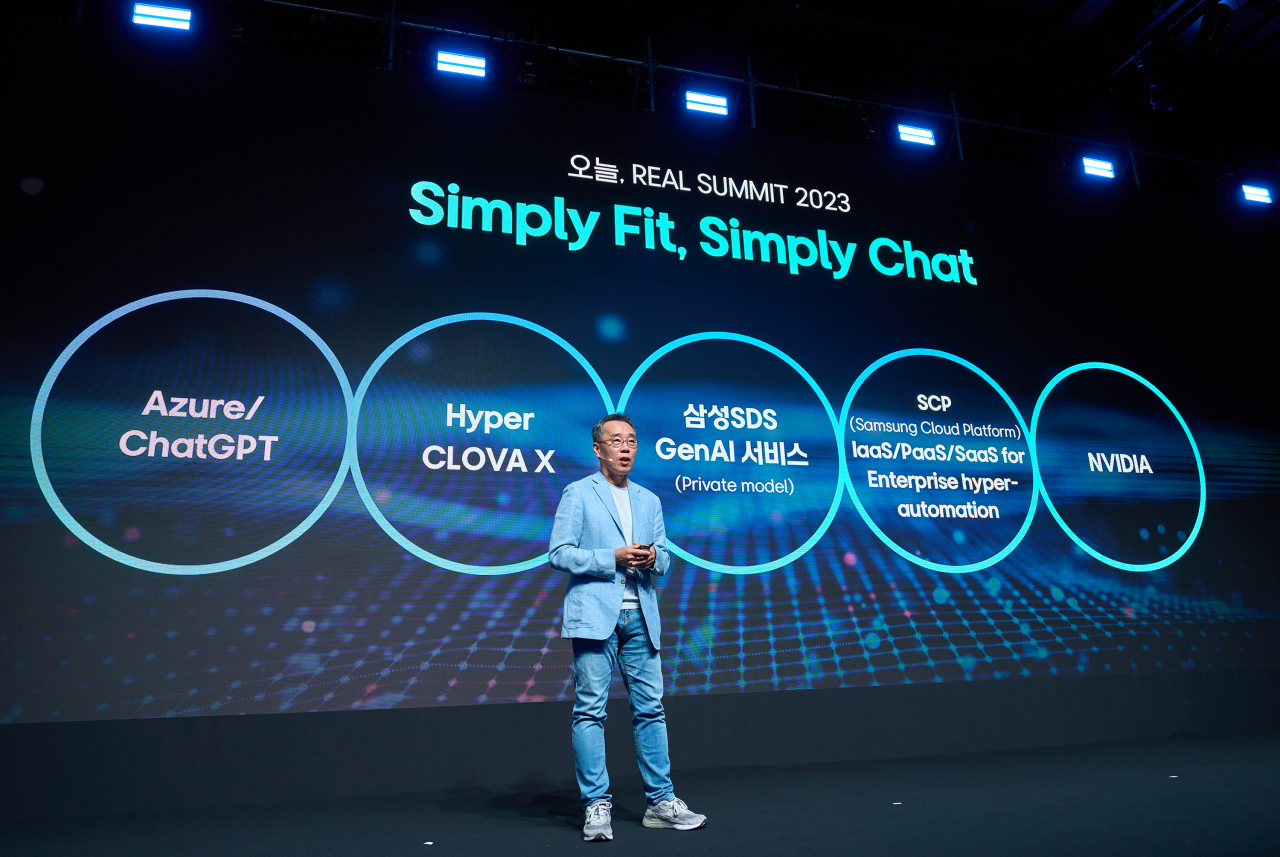 |
Samsung SDS President and CEO Hwang Sung-woo delivers a keynote speech at the company's annual Real Summit in Seoul, Tuesday. (Samsung SDS) |
South Korean IT solutions provider Samsung SDS unveiled new services that will allow its clients to easily adopt generative artificial intelligence in their businesses to improve work productivity, with the aim to usher in hyperautomation innovation.
“There has been a view that generative AI will fall into a chasm due to the variability of human languages, but large language models (LLMs) have paved the way for a true hyperautomation of office work,” Samsung SDS president and CEO Hwang Sung-woo said in a press briefing held earlier in the day in Seoul, shouting “Eureka!”
“We Samsung SDS executives and employees have already begun our journey of accumulating business knowledge and improving productivity using generative AI. … Our proof of concepts has generated surprise results every day already,” he added.
Hyperautomation is an infrastructure of advanced technologies that are used to scale automation capabilities by combining a variety of tools, such as robotic process automation (RPA) and AI to improve business decisions.
On the same day, the IT service provider introduced two generative AI services -- Brity Copilot, a solution that automates intellectual tasks, and FabriX, a platform that accelerates the combination of generative AI with cloud systems -- during its annual Real Summit that presented the firm’s key business cases on sectors such as AI, cloud, enterprise solutions, supply chain and finance.
The CEO touted the services’ excellent compatibility in building and providing a private system for corporate customers who place a high value on security. These can also be combined with various LLMs desired by companies, including OpenAI’s ChatGPT and Naver’s HyperClova X, he explained.
Brity Copilot applies generative AI to intellectual tasks performed in common business systems such as email, messengers, video conferencing and data storage. It overcame the limit of existing RPA, which can only automate simple repetitive tasks.
Song Hae-goo, executive vice president of the business solutions division at Samsung SDS, said that while Brity Copilot and Microsoft's 365 Copilot launched in March perform similar tasks, Samsung's latest solution is more advanced because it can even support a payment program -- a feature that Microsoft does not offer at the moment.
"Considerable business and IT knowledge must be combined (for solutions development). To realize this vision, Samsung SDS focused on minimizing human intervention and strengthening intersystem connectivity," the executive vice president said.
Samsung's in-house testing showed the latest solution improved developers' development speed by 30 percent and doubled the performance of verification speed. It also reduced the time required for creating business documents by 75 percent in enterprise resource planning operations. The automation rate for processing customer requests also increased to 60 percent, while reducing costs by 21 percent, according to Song.
FabriX allows workers to share and use their IT resources such as knowledge assets and work systems by bringing them together on the platform. In addition to an easier and faster process, it also secures data safely through collection, storage and processing features on the Samsung Cloud Platform.
The CEO touted the services’ excellent compatibility in building and providing a private system for corporate customers who value high security. These can also be combined with various LLMs desired by companies, including OpenAI’s ChatGPT and Naver’s HyperClova X, he explained.
Samsung plans to provide customized services to enable businesses to introduce and safely utilize generative AI, with the goal of launching FabriX and Brity Copilot in the latter half of this year and the first half of next year, respectively.
Under its service slogan "Simply Fit, Simply Chat," Hwang vowed to help corporate clients adopt generative AI and use its services safely by providing the most suitable solution through its global and domestic partnerships.







![[Today’s K-pop] Blackpink’s Jennie, Lisa invited to Coachella as solo acts](http://res.heraldm.com/phpwas/restmb_idxmake.php?idx=644&simg=/content/image/2024/11/21/20241121050099_0.jpg)